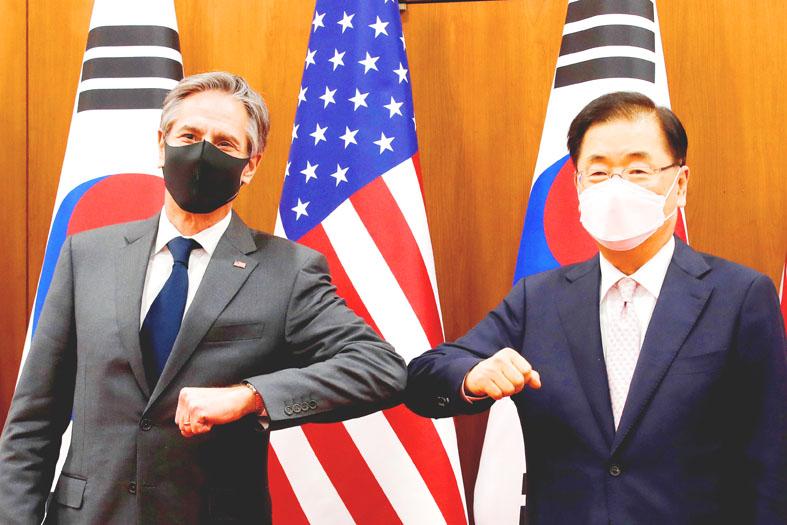The US sanctioned an additional 24 Chinese and Hong Kong officials over Beijing’s ongoing crackdown on political freedoms in the territory, just ahead of talks with China in Alaska.
The step reflects Washington’s “deep concern” about the erosion of Hong Kong’s autonomy following changes to its election system, US Secretary of State Antony Blinken said in a statement yesterday.
Foreign financial institutions that deal with the 24 officials would be subject to US sanctions, the US Department of State said.

Photo: Reuters
The US announcement was made during a visit by Blinken and US Secretary of Defense Lloyd Austin to Japan and South Korea, both of which are wary of China’s growing economic, military and political heft.
The imposition of new sanctions “fully exposes the US side’s sinister intention to interfere in China’s internal affairs, disrupt Hong Kong, and obstruct China’s stability and development,” Chinese Ministry of Foreign Affairs spokesperson Zhao Lijian (趙立堅) told reporters at a daily briefing.
“China will take strong measures as appropriate to resolutely defend national sovereignty, security and development interests,” Zhao said.
While in Tokyo, Blinken and Austin delivered a joint statement with their Japanese counterparts expressing concern about Beijing’s human rights violations against ethnic minorities in Xinjiang and China’s determination to alter the status of the Diaoyutais (釣魚台列嶼), which are administered by Tokyo, but claimed by Taiwan and China.
The two yesterday arrived in Seoul for talks.
Blinken and US National Security Adviser Jake Sullivan are today scheduled to meet Chinese Minister of Foreign Affairs Wang Yi (王毅) and Chinese Central Foreign Affairs Commission Director Yang Jiechi (楊潔篪) in Anchorage, Alaska.
The US has said that the meeting would be an initial opportunity to address intense disagreements over trade and human rights in Tibet, Hong Kong and Xinjiang, as well as the COVID-19 pandemic.
Among those included in the sanctions are Wang Chen (王晨), a member of the Chinese Communist Party’s 25-member politburo, and Tam Yiu-chung (譚耀宗), Hong Kong’s delegate to the Chinese National People’s Congress Standing Committee, which drafted the territory’s National Security Law.
Several officers from Hong Kong’s National Security Division were also sanctioned, including Li Kwai-wah (李桂華), a senior superintendent, as well as Edwina Lau (劉賜蕙), a deputy commissioner of the Hong Kong Police Force and the head of the division.

TPP RALLY: The clashes occurred near the Chiang Kai-shek Memorial Hall on Saturday at a rally to mark the anniversary of a raid on former TPP chairman Ko Wen-je People who clashed with police at a Taiwan People’s Party (TPP) rally in Taipei on Saturday would be referred to prosecutors for investigation, said the Ministry of the Interior, which oversees the National Police Agency. Taipei police had collected evidence of obstruction of public officials and coercion by “disorderly” demonstrators, as well as contraventions of the Assembly and Parade Act (集會遊行法), the ministry said in a statement on Sunday. It added that amid the “severe pushing and jostling” by some demonstrators, eight police officers were injured, including one who was sent to hospital after losing consciousness, allegedly due to heat stroke. The Taipei

NO LIVERPOOL TRIP: Taiwan’s Lin Yu-ting, who won a gold medal in the boxing at the Paris Olympics, was embroiled in controversy about her gender at that event Taiwanese boxer Lin Yu-ting (林郁婷) will not attend this year’s World Boxing Championships in Liverpool, England, due to a lack of response regarding her sex tests from the organizer, World Boxing. The national boxing association on Monday said that it had submitted all required tests to World Boxing, but had not received a response as of Monday, the departure day for the championships. It said the decision for Lin to skip the championships was made to protect its athletes, ensuring they would not travel to the UK without a guarantee of participation. Lin, who won a gold medal in the women’s 57kg boxing

‘NOT ALONE’: A Taiwan Strait war would disrupt global trade routes, and could spark a worldwide crisis, so a powerful US presence is needed as a deterrence, a US senator said US Senator Deb Fischer on Thursday urged her colleagues in the US Congress to deepen Washington’s cooperation with Taiwan and other Indo-Pacific partners to contain the global security threat from China. Fischer and other lawmakers recently returned from an official trip to the Indo-Pacific region, where they toured US military bases in Hawaii and Guam, and visited leaders, including President William Lai (賴清德). The trip underscored the reality that the world is undergoing turmoil, and maintaining a free and open Indo-Pacific region is crucial to the security interests of the US and its partners, she said. Her visit to Taiwan demonstrated ways the

The US has revoked Taiwan Semiconductor Manufacturing Co’s (TSMC, 台積電) authorization to freely ship essential gear to its main Chinese chipmaking base, potentially curtailing its production capabilities at that older-generation facility. American officials recently informed TSMC of their decision to end the Taiwanese chipmaker’s so-called validated end user (VEU) status for its Nanjing site. The action mirrors steps the US took to revoke VEU designations for China facilities owned by Samsung Electronics Co and SK Hynix Inc. The waivers are set to expire in about four months. “TSMC has received notification from the US Government that our VEU authorization for TSMC Nanjing